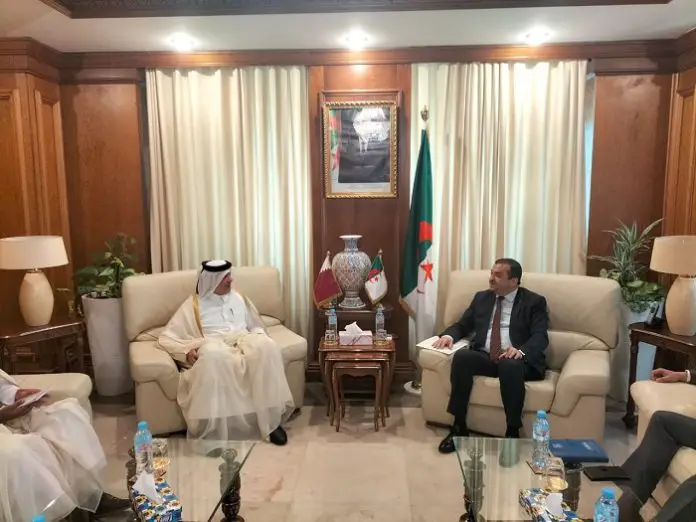IF ALGERIA, TUNISIA AND MOROCCO OBSERVE A CERTAIN NEUTRALITY, LIBYA AND MAURITANIA HAVE REDUCED THEIR DIPLOMATIC RELATIONSHIPS WITH DOHA.
On the tenth day of the month of Ramadan, the decision was brutal. Like a diplomatic surprise: quick, precise, methodical. Saudis and some allies (Bahrain, United Arab Emirates, Yemen, Egypt) gave the Qatari emirate Monday after the prayer of dawn. With, in indirect support, Donald Trump. Who went to the Middle East with simple ideas and a very limited cultural background. On Twitter, @POTUS (President Of The United States) tells 140 signs (which is short for such a complex region), that it demanded the end of terrorist financing and that the Saudis – flanked by friendly countries – Designated Qatar as sole and sole responsibility for international terrorism. In other words, the Qatari case settled, terrorism should disappear … Qatar, a country which, for want of a public census, has an estimated population of 300,000 inhabitants in a space where half of the population is made up of well-paid expatriates, Often from western countries, unlike a labor force originating in India, Pakistan, Nepal or others, exploited with wages of misery derived from their work in many yards, in particular those of the World 2022.
From Rabat to Tunis, foreign ministers spoke laconically. This settlement of accounts between petromonarchies intervenes during a period of social unrest in Morocco as in Tunisia. And this emerging division is added to others (Syria, Yemen). The five countries that make up the Maghreb react according to their political culture. And to the alliances of yesterday, to the counter-alliances of to-day. And the stigma of the “Arab Spring”.
Morocco in neutrality
In Morocco, a tangible sign: Royal Air Maroc has maintained its five weekly Casablanca-Doha routes. RAM operates in partnership with Qatar Airways on other destinations. Diplomatically speaking, it is worth recalling that the first visit of the Emir Al-Thani goes back to 27 December 2013 and that Morocco, a historic ally of Saudi Arabia, also has good relations with Qatar. Result: a mediation carried out by Mohamed VI was thus desired by some but, for the time being, nothing filtered from the royal palace.
Tunisia in shades
Leaders of the Arab world, Beji Caïd Essebsi is the veteran. He knows this little world, diplomatically and humanely, as little. He preserves this concern for independence from Bourguiba. His foreign minister, Khemaies Jhinaoui, said that Tunisia wanted “our brothers in the Gulf to find a compromise in order to overcome their differences and find a solution”. Nevertheless, when the idea of a major investment conference, Tunisia 2020, was launched, it was under the patronage of two nations: France and Qatar. Emir Al-Thani opened the demonstration on 27 November 2016 at the Palais des Congrès in Tunis. A strong symbol. This did not prevent Tunis from maintaining a solid relationship with Riyadh even though, when the Tunisians liberated themselves from the dictatorship on January 14, 2011, the kingdom of Saud was not on the balcony to applaud. Ben Ali, the dictator who ruled for twenty-three years over the country, has also found refuge in Jeddah, Saudi Arabia.
If rumors about the role of Qatar, its soft power via Al Jazeera, and its financing channels are flourishing, evidence of Qatari involvement in terrorism that has bloodied Tunisia have never been produced. The nostalgic of the dictatorship accuse Doha of having favored, with the West, the revolution of 2011. As a reminder, it is necessary to know that 25 000 Tunisians are currently residing in Qatar and their security is a concern of the authorities on a daily basis.
Silent Algeria
For the country of Bouteflika, here is the context. January 2013: the Emir of Qatar is on an official visit to Algiers; Signing of a series of seven economic partnerships in the key areas of the two countries: energy. There is a warming of diplomatic relations between Doha and Algiers via trade. Four years later, the Algerian government favors “neutrality and dialogue” with regard to this emerging crisis on the Gulf of Aden. His Foreign Minister, in a statement, called on “all the countries concerned to adopt dialogue as the only way to resolve their differences”. Concerned about non-interference, Algiers nevertheless expressed its “great concern”.
Libya: a contradictory
On the Libyan side, for lack of political unity, the reactions diverged from Tripoli to Tobruk. In the east, where the authorities in power are supported by the United Arab Emirates in particular, the decision was taken: total break with Qatar. But on the Libyan soil, the games of influence are moving. Qatar played a military role alongside NATO in 2011 against the Gaddafi regime that was about to crush Benghazi. Then Doha supported, along with Turkey, the Islamist forces that ruled in Tripoli. An interventionism that feeds the rancours of the day.
Mauritania: break without surprise
In February, Nouakchott signed a salvo of development agreements with the Saudis in many fields, from finance to agriculture, customs to infrastructure … On January 4, an agreement of military cooperation between the two nations was signed. Mauritania is a member of the G5 Sahel. Logically, the Mauritanian Islamic Republic, presided over by Mohamed Ould Abdel Aziz, aligned itself with his new Saudi friend. Chad and Senegal will do the same.
Upon arrival, a crisis that fragments the Arab world
Ultimately, Qatar will have little to do with the blockade put in place by Saudi Arabia and its supporters. The power of the Saud remains undeniable. But this high-risk episode that is taking place in the Gulf forces a number of Arab and African capitals to take a stand. A new map of alliances will not fail to emerge. Faced with this, the trio Algiers, Rabat, Tunis should keep its distance despite the Saudi pressures.














